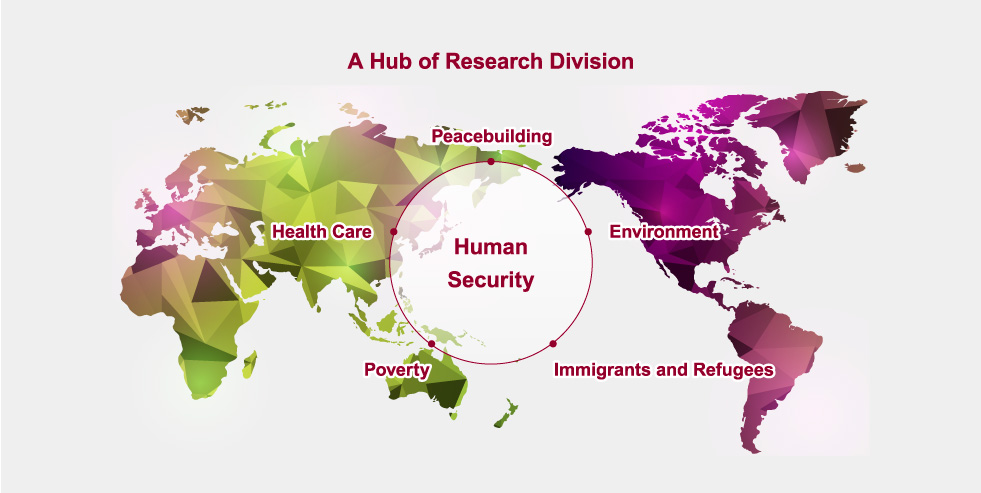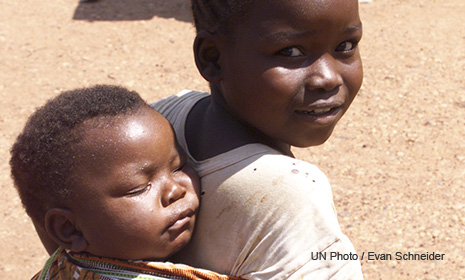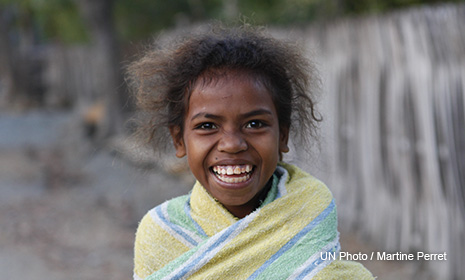


The Sophia Institute for Human Security (SIHS) considers poverty, environment, health care, immigrants and refugees, and peacebuilding as the five important human security issues for an international society. The SIHS will work on the realization of human security through academic research by becoming an international center of excellence using social science research methods to design effective policies for institutions to solve these issues.
The SIHS considers the following two basic policies as essential for the realization of human security: 1) To tackle the realization of human security through social science research results and 2) to promote research based on local circumstances and problems while collaborating with local researchers.
The Ministry of Education, Culture, Sports, Science and Technology selected Sophia University’s research branding projects as a Private University Research Branding Project for two consecutive years in 2016 and 2017. In the 2017 project, although the core of the project was our research on human security, we linked human security with education and career development support as we progressed in our project. Thus, SIHS was established to promote human security research.
After a petition by Sophia University, the Ministry of Education, Culture, Sports, Science and Technology selected the Sophia University Branding Project for Formation of an International Center of Excellence in the Realization of Human Security as a Private University Research Branding Project in 2017.
This project intends to build the Sophia University brand as the university that advances research towards solving today’s global issues “for others, with others” by becoming an international center of excellence in the realization of human security. In addition, Sophia University’s brand will be built not only by advancing research, but also by developing and raising human resources who will consider the dignity of human beings in becoming international leaders for our future society.
Our research division consists of five units: i.e., poverty, environment, health care, immigrants and refugees, and peacebuilding. The developing regions of Africa, Southeast Asia, and South Asia are our main research fields. Each research unit sets the following research theme.

Towards a Strategy for Improving the Resilience of the Poor Against Risks and Better Understandings of Mechanisms and Institutions to Reduce Poverty
Most of the extreme poor in Asia and Africa have limited access to both public and private services. As a result, their livelihoods are extremely vulnerable to various natural, economic, and financial risks that may happen suddenly and unexpectedly. Based on micro-observational and experimental data, including randomized controlled trials, our research aims to explore ways by which the poor can strengthen their resilience against those risks. The overall objectives of our research are to obtain better understandings of the mechanisms and underlying causes of poverty and to identify institutions that contribute to reducing poverty.

Study to Identify the Structure of the Threats Faced by Immigrants and Refugees and to Explore Institutional Designs to Mitigate the Risk of the Threats
About 65 million refugees, internally displaced persons, and immigrants are currently attempting to escape from domestic threats such as conflict and poverty. We theoretically and empirically analyze the structure of the threats faced by immigrants and refugees with respect to their socioeconomic status and also explore institutional designs to resolve this issue in domestic societies and/or the international community. In particular, we will conduct interdisciplinary social scientific research on education, health, labor, welfare, population ethics, incentives, and institutional sustainability.

Study on Health System Reform Policies in Progress Towards Universal Health Coverage (UHC) and the Governance of Reform Policy Implementation
Achieving universal health coverage (UHC), i.e., universal access to necessary quality health services without the risk of financial catastrophe or impoverishment, is an important item on the global policy agenda. Recently, many African and Asian countries have been endeavoring to progress towards UHC by planning and implementing health system reform policies that aim to address various issues such as health-care financing and human resources for health. These reforms often require significant changes in existing health systems and many reform policies have faced implementation challenges. In this research program, the Health Care Unit will look at some of the reform policies and examine the effects and implementation challenges of these reforms to draw important policy implications. The study results will also contribute to reducing gaps in knowledge on important aspects of the governance of implementing new reform policies.

Exploration of Solutions for Environmental Issues in Developing Countries Considering Economies of Both Developed and Developing Countries
Economic development tends to cause environmental degradation in developing countries. Due to economic globalization, the economic activities of firms from developed countries also affect the environment in developing countries through trade and foreign direct investment. Environmental degradation threatens the health of people in both developed and developing countries. However, cross-border pollution means that the environmental degradation in developing countries causes problems for the environment in developed countries and the health of their populations. Thus, we need to have a global perspective to resolve the environmental issues in developing countries. In our project, we use economics strategies to tackle environmental issues in developing countries by considering the international economic relationships between developed and developing countries. Our goal is to explore policies solving the environmental issues and to understand how these policies would affect economies in both developed and developing countries.

Researches and Proposals to Advance Peacebuilding Activities to Achieve Sustainable Peace by Reconstructing Governance in War-Torn States
The concept of human security is defined as a policy for how the international community can protect people when states do not have the capacity or will to protect the people in their territories. Postconflict peacebuilding, which aims to create sustainable peace by reconstructing governance in war-torn states, is a core agenda for human security. Since 2016, Sophia University in Tokyo has implemented a series of seminars on “Human Security and Peacebuilding.” In 2017, the university also conducted a study tour for peacebuilding by taking students to East Timor. Sophia University’s faculty members have also proposed policies to support peacebuilding in different cases of conflicted states based on their field research. The Sophia Institute for Human Security continues to conduct these activities to support peacebuilding worldwide.